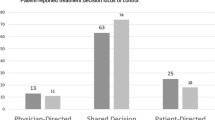Abstract
Treatment choices for metastatic prostate cancer are complex and can involve men balancing survival versus quality of life. The present study aims to elicit patient preferences with respect to the attributes of treatments for metastatic prostate cancer through a discrete choice experiment (DCE) questionnaire. Men with recently diagnosed localized prostate cancer were asked to envisage that they had metastatic disease when completing a survey. As expected, men with prostate cancer placed considerable importance on gains in survival; however, avoiding side effects of treatment was also clearly important. Survival gains should be considered alongside side effects when discussing treatment options in metastatic disease.
This is a preview of subscription content, access via your institution
Access options
Subscribe to this journal
Receive 4 print issues and online access
$259.00 per year
only $64.75 per issue
Buy this article
- Purchase on Springer Link
- Instant access to full article PDF
Prices may be subject to local taxes which are calculated during checkout

Similar content being viewed by others
References
Schelhammer PF, Sharifi R, Block N, Soloway MS, Venner PM, Patterson AL et al. Clinical benefits of bicalutamide compared with flutamide in combined androgen blockade for patients with advance prostatic carcinoma: final repot of a double blind randomized multicenter trial. Urology 1997; 50: 330–336.
Schellhammer PF . An evaluation of bicalutamide in the treatment of prostate cancer. Expert Opin Pharmacother 2002; 3: 1313–1328.
Jenkins V, Fallowfield L, Edginton T, Payne H, Hamilton E . Preferences of healthy men for two different endocrine treatment options offered for locally advanced prostate cancer. Curr Med Res Opinion 2005; 21: 1329–1335.
Sculpher M, Bryan S, Fry P, de Winter P, Payne H, Emberton M . Patients’ preferences for the management of non-metastatic prostate cancer: discrete choice experiment. BMJ 2004; 328: 382.
Louviere J, Hensher D, Swait JD, Adamowicz W . Stated Choice Methods: Analysis and Applications. Cambridge University Press: Cambridge, UK, 2000.
Ryan M, Farrar S . Using conjoint analysis to elicit preferences in health care. BMJ 2000; 320: 1530–1533.
Osman LM, McKenzie L, Cairns J, Friend JAR, Godden DJ, Legge JS et al. Patient weighting of importance of asthma symptoms. Thorax 2001; 56: 138–142.
Lloyd A, McIntosh E, Price M . The importance of drug adverse effects compared with seizure control for people with epilepsy: a discrete choice experiment. Pharmacoeconomics 2005; 23: 1167–1181.
Denis LJ, Keuppens F, Smith PH, Whelan P, Carneiro de Moura JL, Newling D et al. Maximal androgen blockade: final analysis of EORTC phase III trial 30853. EORTC Genito-Urinary Tract Cancer Cooperative Group and the EORTC Data Center. Eur Urol 1998; 33: 144–151.
Hedlund PO . Side effects of endocrine treatment and their mechanisms: castration, antiandrogens and estrogens. Prostate 2000; 10: 32–37.
Prostate Cancer Trialists Collaborative Group. Maximum androgen blockade in advanced prostate cancer: an overview of randomised trials. Lancet 2000; 355: 1491–1498.
Eisenberger MA, Blumenstein BA, Crawford ED, Miller G, McLeod DG, Loehrer PJ et al. Bilateral orchiectomy with or without flutamide for metastatic prostate cancer. N Engl J Med 1998; 339: 1036–1042.
Tyrrell CJ, Altwein JE, Klippel F, Varenhorst E, Lunglmayr G, Boccardo F et al., for the International Prostate Cancer Study Group. Multicenter randomized trial comparing zoladex with zoladex plus flutamide in the treatment of advanced prostate cancer. Cancer 1993; 72: 3878–3879.
Boccardo F, Pace M, Rubagotti A, Guarneri D, Decensi A, Oneto F et al. Goserelin acetate with or without flutamide in the treatment of patients with locally advanced or metastatic prostate cancer: the Italian Prostatic Cancer Project (PONCAP) Study Group. Eur J Cancer 1993; 29A: 1088–1093.
Acknowledgements
We acknowledge the support and scientific insight from Mr Joe Crawley and Mr Sanjay Gandhi, Astra Zeneca. This research was supported by AstraZeneca Pharmaceuticals LP, Wilmington, DE, USA.
Author information
Authors and Affiliations
Corresponding author
Additional information
Declaration
Professor Penson has undertaken consultancy work for Astra-Zeneca, Dendreon and Sanofi-Aventis.
Rights and permissions
About this article
Cite this article
Lloyd, A., Penson, D., Dewilde, S. et al. Eliciting patient preferences for hormonal therapy options in the treatment of metastatic prostate cancer. Prostate Cancer Prostatic Dis 11, 153–159 (2008). https://doi.org/10.1038/sj.pcan.4500992
Received:
Accepted:
Published:
Issue Date:
DOI: https://doi.org/10.1038/sj.pcan.4500992
Keywords
This article is cited by
-
Eliciting men’s preferences for decision-making relative to treatments of localized prostate cancer with a good or moderate prognosis
World Journal of Urology (2023)
-
Discrete-Choice Experiment to Understand the Preferences of Patients with Hormone-Sensitive Prostate Cancer in the USA, Canada, and the UK
The Patient - Patient-Centered Outcomes Research (2023)
-
A Systematic Review of Discrete Choice Experiments in Oncology Treatments
The Patient - Patient-Centered Outcomes Research (2021)
-
Physician preferences for non-metastatic castration-resistant prostate cancer treatment
BMC Urology (2020)
-
Risk as an Attribute in Discrete Choice Experiments: A Systematic Review of the Literature
The Patient - Patient-Centered Outcomes Research (2014)



